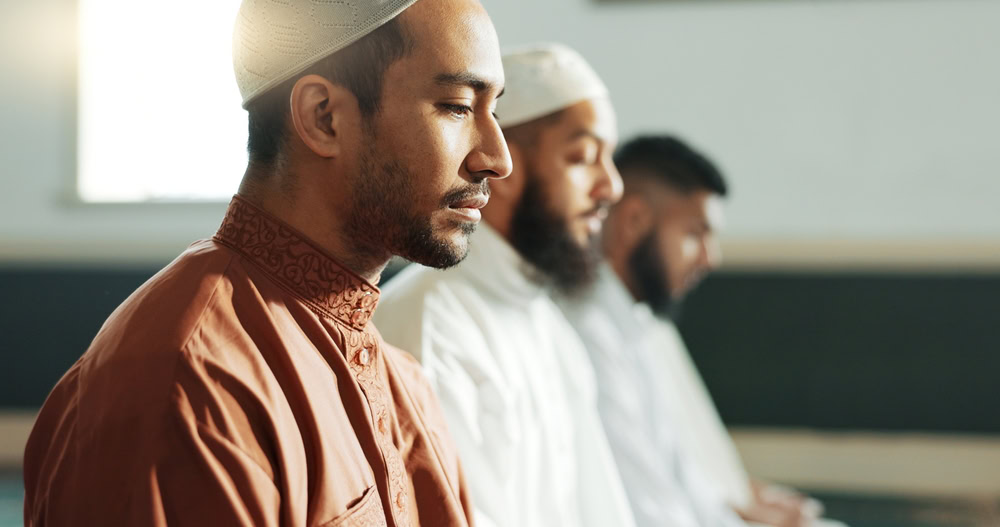Is Saying Someone “May Allah Accept It” after the Prayer a Bid’a?
Answered by Shaykh Muhammad Fayez Awad
Question
Is saying “Taqabbal Allahu” (May Allah accept it) after the prayer an innovation?
Answer
Praise be to Allah, Lord of the worlds, and peace and blessings be upon the Messenger of Allah, his Family, and all his Companions.
The act of praying for acceptance and shaking hands after the prayer is permissible and ranges between being permissible and recommended. It is not a pillar or part of the prayer. If said occasionally without believing it to be a part of the prayer, there is no harm in it.
Dua
This practice is mentioned on the day of Eid. Khalid Ibn Ma‘dan said:
“I met Wathila ibn al-Asqa’ on Eid day and said: ‘Taqabbal Allahu minna wa minka (May Allah accept from us and from you).’ He replied: ‘Yes, Taqabbal Allahu minna wa minka.’ Wathilah said: ‘I met the Messenger of Allah (Allah bless him and give him peace)
on Eid day and said the same to him, and he replied: “Yes, Taqabbal Allahu minna wa mink”’.” [Bayhaqi; Tabarani]
The phrase “Taqabbal Allahu” is intended as a prayer that Allah accepts the prayer, fasting, or any other deed from the person. Therefore, it is permissible as it signifies a prayer, and it is part of good speech and making dua for others. There is no prohibition against it as we are commanded to pray in general, as Allah (Most High) says:
“Your Lord has proclaimed, ‘Call upon Me, I will respond to you. Surely those who are too proud to worship Me will enter Hell, fully humbled.’” [Quran, 40:60]
Shaking Hands
As for shaking hands, it falls under the general recommendation for Muslims to shake hands with each other, which is a reason for Allah’s pleasure with them, the removal of grievances from their hearts, and the dropping of their sins with the handshake. The Prophet (Allah bless him and give him peace)
said: “There are no two Muslims who meet and shake hands but they will be forgiven before they part.” [Abu Dawud; Tirmidhi; Ibn Maja]
Regarding the customary handshake after the Fajr and ‘Asr prayers, Imam Abu Muhammad Ibn ‘Abdu Salam (Allah be pleased with him) said that it is among the permissible innovations, and it is neither described as disliked nor recommended. This is a good statement. The preferred opinion is that if one shakes hands with those who were with him before the prayer, it is permissible, as we mentioned, and if he shakes hands with those who were not with him before it, it is recommended; because shaking hands upon meeting is a Sunna by consensus due to the authentic hadiths on this matter. [Nawawi, al-Majmu‘ (and he said similar in Kitab al-Athar)]
Ibn ‘Allan said that although it is an innovation, if a Muslim extends his hand to shake hands, one should not turn away by withdrawing the hand, as the harm caused by that outweighs the consideration of etiquette, even though it may be said to be aiding in an innovation, due to its conciliatory nature. [Ibn ‘Allan, Futuhat al-Rabbaniyya; Ali Qari, Mirqat al-Mafatih]
Therefore, one should not denounce those who practice it but should be aware that it is not related to the prayer or its Sunna and etiquettes. May Allah grant success.
[Shaykh] Dr. Muhammad Fayez Awad.
Shaykh Dr. Muhammad Fayez Awad, born in Damascus, Syria, in 1965, pursued his Islamic studies in the mosques and institutes of Damascus. A graduate of the Islamic University of Medina in 1985, he holds a Ph.D. in Islamic Studies from Bahauddin Zakariya University in Pakistan.
He has extensive experience developing curricula and enhancing the teaching of various academic courses, including conducting intensive courses. Shaykh Awad has taught Fiqh, Usul al-Fiqh, Quranic sciences, the history of legislation, inheritance laws, and more at several institutes and universities such as Al-Furqan Institute for Islamic Sciences and Majma‘ al-Fath al-Islami in Damascus.
He is a lecturer at the Sultan Muhammad al-Fatih Waqf University in Istanbul, teaching various Arabic and Islamic subjects, and teaches at numerous Islamic institutes in Istanbul. Shaykh Awad is a member of the Association of Syrian Scholars, a founding member of the Zayd bin Thabit Foundation, a member of the Syrian Scholars Association, and a member of the Academic Council at the Iman Center for Teaching the Sunna and Quran.
Among his teachers from whom he received Ijazat are his father, Shaykh Muhammad Muhiyiddin Awad, Shaykh Muhiyiddin al-Kurdi, Shaykh Muhammad Karim Rajih, Shaykh Usama al-Rifai, Shaykh Ayman Suwaid, Shaykh Ahmad al-Qalash, Shaykh Muhammad Awwama, and Shaykh Mamduh Junayd.
